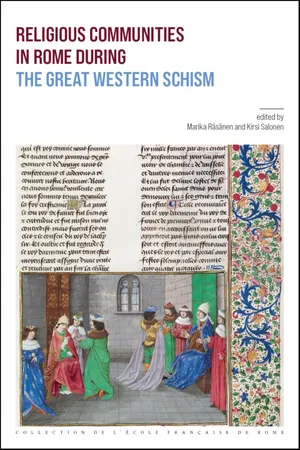
Religious communities in Rome during the Great Western Schism
- English
- ePUB (mobile friendly)
- Available on iOS & Android
Religious communities in Rome during the Great Western Schism
About this book
The Great Western Schism (1378-1417) is considered the deepest crisis of the late medieval Church. The contested election of Pope Urban VI in 1378 divided the Catholic Church into two competing factions: the Roman papacy under Pope Urban VI and the French papacy under Clement VII. The Schism had severe consequences, especially for the Roman papacy: the papal administration in Rome lost most of its competent staff as many officials sided with Clement VII and returned to Avignon, leaving Pope Urban VI with a skeleton staff; the city of Rome and the surrounding countryside suffered from intense fighting; religious institutions were not only split in two during the Schism, but they also faced repeated economic hardships as mercenary troops ravaged the Roman countryside and the Roman popes extracted property from churches and monasteries to finance warfare, or donated the landed property of these institutions to their lay supporters in exchange for military services. The effects of the Schism were largely harmful for the various religious institutions in Rome, but the overall picture is not necessarily that negative, as the Schism also presented new opportunities for different Roman actors. The current volume studies the resilience of the Roman papacy and its clergy, international religious and lay orders and the local community of Jews, and shows how these actors overcame the hardships caused by the Schism.
Frequently asked questions
- Essential is ideal for learners and professionals who enjoy exploring a wide range of subjects. Access the Essential Library with 800,000+ trusted titles and best-sellers across business, personal growth, and the humanities. Includes unlimited reading time and Standard Read Aloud voice.
- Complete: Perfect for advanced learners and researchers needing full, unrestricted access. Unlock 1.4M+ books across hundreds of subjects, including academic and specialized titles. The Complete Plan also includes advanced features like Premium Read Aloud and Research Assistant.
Please note we cannot support devices running on iOS 13 and Android 7 or earlier. Learn more about using the app.
Information
Table of contents
- Introductory pages
- Table of contents
- Foreword
- The Schism in Rome: introduction
- Part I. Setting the scene
- Part II. The international orders in the Roman setting
- Part III. Negotiating the Schism in Rome
- Closing reflections on some open questions